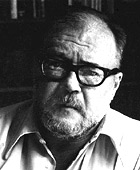Born in 1927 in Martins Ferry, Ohio, one of the steel-producing towns strung out along the heavily-industrialized Upper Ohio River as it borders West Virginia and Pennsylvania, James Wright graduated with honors from Kenyon College in 1952 and studied in Vienna the next year on a Fulbright fellowship.
In 1954 he went on to the University of Washington where he studied with Theodore Roethke and Stanley Kunitz. That year, when he was still a graduate student, W. H. Auden selected his manuscript for publication in the Yale Younger Poets Series. In 1957, when The Green Wall was published, he joined the faculty of the University of Minnesota where his colleagues were Allen Tate and John Berryman. In 1959, he earned a PhD from Washington with a dissertation on Charles Dickens and his second collection, Saint Judas, was published in the new and distinguished Wesleyan University Press series in which a rotating board of poets acted as editorial advisors. During this period, Wright contributed reviews to major publications like the Sewannee Review and regularly published in virtually every important journal, from the New Yorker to the New Orleans Poetry Review. Nonetheless, the University of Minnesota did not believe he had the qualifications to become a tenured professor, and Wright had to relocate to nearby Macalester College.
He had married Liberty Kardules in Martins Ferry in 1953. Two sons, Franz in 1953, and Marshall in 1958, were born from a marriage which became so troubled that a separation occurred in 1959 and it dissolved in a divorce finalized in 1962. During these difficult years, Wright entered into a friendship with Robert Bly, a poet who had been struggling to find his own voice after a Harvard education and an MFA degree from the University of Iowa Writers Workshop. Bly was interested in poetry that suggested there were vast powers that awaited release, and he and Wright worked together on European and Latin American poets like Georg Trakl and Cesar Vallejo who deliberately stretched the boundaries of poetic language.
Wright’s third book, which Wesleyan had accepted under the title Amenities of Stone, was entirely recast by Wright during this period. The manuscript that resulted was The Branch Shall Not Break (1963), one of the most influential volumes of the 1960s; it announced, along with the companion work of W. S. Merwin, Sylvia Plath and Galway Kinnell, that contemporary poetry was moving in a new direction, away from a discursive formalism and toward an experimental free verse so new that critics could only describe it as "surrealistic," somewhat helplessly drawing on terms from a much older literary generation.
In 1967, when he was 40, he married Edith Anne Crunk, the "Annie" of several of his later poems. He also published Shall We Gather at the River, a collection that was in some respects unified as if it might be a long poem or the notes for a long poem. Some feel it is his most impressive achievement. Wright has said, in a 1972 interview with Peter Stitt, that in the book "I was trying to move from death to resurrection and death again, and challenge death finally." At the same time, the poems, many of them confronting the bleakness of West Virginia and Ohio mill towns, were intensely personal: "I was trying to write about a girl I was in love with who has been dead for a long time, I tried to sing with her in that book. Not to re-create her; you can’t re-create anybody, at least I can’t. But I thought maybe I could come to terms with that feeling which has hung on in my heart for so long. The book has been damned because it is so carefully dreamed."
That political and social issues were part of the fabric of understanding was the necessary conclusion of all of the experimenting poets of the 1960s, and in a Collected Poems of 1971 (that was absurdly premature), Wright offered a sheaf of "New Poems" in which his interest in the voices of those who have been forgotten – most of them touched upon in the numbered stanzas of his "The Minneapolis Poem": the homeless poor, the disenfranchised native American, homosexuals, African Americans – presses him into opening the tonal range of his own voice, which now becomes a wild mixture of abrupt confessions, lyrical perceptions, disjointed observations, and ironic asides.
As awards and honors mounted – since 1966 he had been teaching at Hunter College and had received a Rockefeller Foundation grant and the Pulitzer Prize for his Collected Poems – he continued to write in a manner that was deliberately vulnerable, a remarkable extension of the "confessional" poetry that had earlier flourished in the late 1950s and early 1960s but which moved beyond the merely autobiographical to raise questions of social justice. Two Citizens, the title of a 1973 collection, refers at once to him and Annie together, but the term "citizens" insists upon a sense of responsibility and personal dignity that he will extend to others.
Even in final works, in prose poems (collected as Moments of an Italian Summer) and the intensely lyrical record of his last collection, This Journey (1980), he kept writing pieces in which he could appear actively to step outside of the page and directly address the subject of his writing and even the reader in the act of reading.
In 1979, a chronic sore throat was diagnosed as cancer of the tongue. Wright died on March 25, 1980. |






